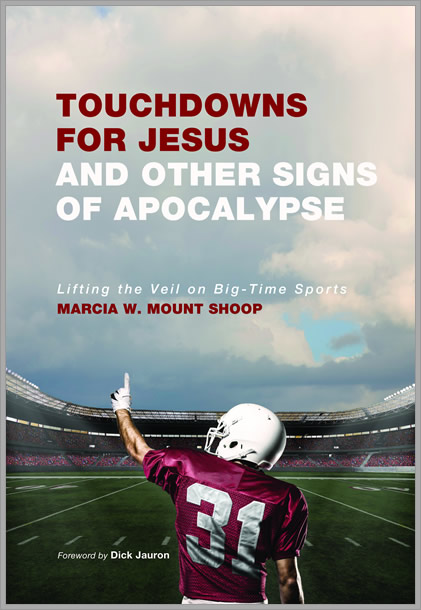Soft Footballs, Crying Quarterbacks, and Other Offensive Formations
Super Bowl week is here! And that means that the NFL is stretched out in all of its media glory for America to adore and, more now than perhaps ever in the history of American football, to dissect.
The scrutiny that football is under right now is indeed unprecedented. The 2014 season has been one thing after another in the world of American football in general, and not just for the NFL. From more talk about concussions, to college players trying to form unions, to domestic violence, to lawsuits against the NCAA for academic fraud, the pressure is building for football to come clean about its problems.
That said, human nature shows itself again and again to be particularly agile when it comes to avoiding the big questions. We can say we’re sorry for the little missteps, but changing long held patterns, hallowed assumptions, and unconscious biases are not transitions we surrender to easily.
But welcomed or not, our societal moment has surfaced the big questions about football. And the NFL is an emblem of what it looks like for a powerful institution to feel the pressure of these profound systemic questions.
___________________________________________
Something is shaking loose, becoming more malleable, and I don’t think it is just the Patriots’ footballs.
___________________________________________
What is a behemoth to do when its habitat starts to turn on it and change? To be sure, America still feeds the monster hearty helpings of its money and obsessive interest, but the diet is changing, and it is fascinating to watch the constitution of the beast change along with it.
These last two weeks have been particularly interesting. New signs of masculinity’s malleability are starting to twist the innards of this “man’s game.”
It isn’t lost on me that America has become fixated on deflated footballs as if the very structure of the cosmos was coming undone. The anxiety these accusations elicited, the reactions of the powers that be, and the familiar pattern of looking for an underling to blame all display the architecture of caricatured (white) masculine ways of solving problems.
For starters, those with power deny responsibility and set the tone for the crisis. “We would never do something like that, because we say we would never do something like that. And you should believe us because of who we are—the ones who get to say what is right and wrong, the ones who set the rules, the ones who run the show.”
___________________________________________
What is a behemoth to do when its habitat starts to turn on it and change?
___________________________________________
If something does happen that calls the power brokers into question, then there must be someone else to blame who is lower down the totem pole—a bad apple, someone who can be chastised and punished for their transgressions and for soiling the good name of the powerful. These institutionally entrenched muscle sets of power and privilege have been flexing all over the place as America discusses the intricacies of and problems with soft footballs.
Patriots quarterback, Tom Brady, confessed a few days ago that he had gotten his feelings hurt and that he had resolved not to take these accusations so personally. A man with his feelings hurt! Footballs that were too soft! What is happening to this game, this bulwark of masculinity?!
Meanwhile, almost simultaneously with the deflation of the footballs happening on the east coast, there was a grown man crying tears of joy on the west coast because his team came back from a 19-7 deficit with less than 4 minutes to go to take the game into overtime and win.
Media scrutiny of Seattle quarterback Russell Wilson’s tears was overtaken by ‘deflategate’ almost immediately. And the unfortunate attempt to overlay a “we-shall-overcome” virtual sound track to Wilson’s tears backfired. His crying quickly morphed into something the Seattle Seahawks had to apologize for because they used a Martin Luther King, Jr. quote in a tweet of a picture of Wilson crying.
___________________________________________
These institutionally entrenched muscle sets of power and privilege have been flexing all over the place as America discusses the intricacies of and problems with soft footballs.
___________________________________________
Yet another iconic moment in which power, masculinity, and race showed themselves to be tangled up realities that we don’t exactly know how to collectively navigate.

Russell Wilson and Marshawn Lynch celebrating the Super Bowl XLVIII
Photo Credit: CC flickr.com/photos/aftfalcodog/
Were it not for the softened footballs, maybe America could have spent some time musing about what it means to see someone who is supposed to represent toughness and masculinity cry in front of the whole country. Crying has not been a part of acceptable male gender performance for generations in American culture. Could football really be getting too soft?
Something is shaking loose, becoming more malleable, and I don’t think it is just the Patriots’ footballs.
The interesting complexity of masculinity and power continue to be on display in the NFL this week with media day. This time, the complexity is embodied in the creative resistance of Marshawn Lynch to the enforced conformity of the NFL. Lynch has been fined upwards of $100,000 for defying the League’s policies and procedures about talking to the media. At the Super Bowl media day he showed up and “showed out.”
___________________________________________
Challenging the power structures, asking the complicated systemic questions, pushing back against the behemoth – these are not common sights we see in the spectacle of Super Bowl week.
___________________________________________
Lynch is taking up space in this bastion of masculine power as his own man. He says he doesn’t want to talk to the media—and so he doesn’t. At the media day he answered the questions of every reporter with “I am just here so I won’t get fined.” Such audacious behavior is no doubt an eye gouge to the Roger-Goodell-types who make and enforce the rules.
The enforced conformity of the NFL is wilting in its character—it is all encompassing, and it packs a punch. The League is able to control what coaches and players say publicly with fines and reprimands. Even worse, those who don’t conform will likely find themselves getting a reputation. The NFL doesn’t like non-conformists or anyone who questions the power structure.
During my husband John’s time coaching in the League, we heard stories about the infantilizing ways some owners treated players who were active in the NFL Players Union. Furthermore, attempts to unionize coaches have been largely unsuccessful. If there’s one job in the football hierarchy that rewards you for being a company guy, it is coaching. So challenging the power structures, asking the complicated systemic questions, pushing back against the behemoth – these are not common sights we see in the spectacle of Super Bowl week.
___________________________________________
If football is to survive in our present day, it must come of age and embody a more generous and honest space for both men and women to occupy.
___________________________________________
In Touchdowns for Jesus, I ask the question in my chapter on gender (“Man Up”) about whether big-time sports like football depend on exclusionary and even abusive models of masculinity to thrive. Caricatured masculinity doesn’t just hurt women; it diminishes the lives of men, too. If football is to survive in our present day, it must come of age and embody a more generous and honest space for both men and women to occupy.
 How much does football lean on the constricted and restrictive performance of dominating masculinity to survive? If what we’ve seen these last two weeks is any indication, we may be in for some surprises, and even some new beginnings.
How much does football lean on the constricted and restrictive performance of dominating masculinity to survive? If what we’ve seen these last two weeks is any indication, we may be in for some surprises, and even some new beginnings.
Abuse of power comes in many packages—and it is tangled up with race, gender, religion, and economics in a snarl of unconscious habits and vested interests that are seemingly impossible to unravel. Football, in turn, is an icon of this snarl in our culture. That said, maybe these last several days have given us some promising glimpses of what is emerging. Here’s to the Marshawn Lynch’s and Russell Wilson’s of the world for stretching themselves into new – even dangerous – territory in American society. Big-time football may not have room for softer footballs, but maybe it is developing space for men who find the courage to truly be themselves in this American man’s game. This could become a win-win situation for us all.
*****
AUTHOR BIO: The Rev. Marcia Mount Shoop, PhD is a theologian, minister, and author who lives in West Lafayette, Indiana. She blogs at www.marciamountshoop.com and you can follow her on Twitter @mmountshoop.













Pingback: Read Marcia Mount Shoop on the Super Bowl/NFL / Press Releases